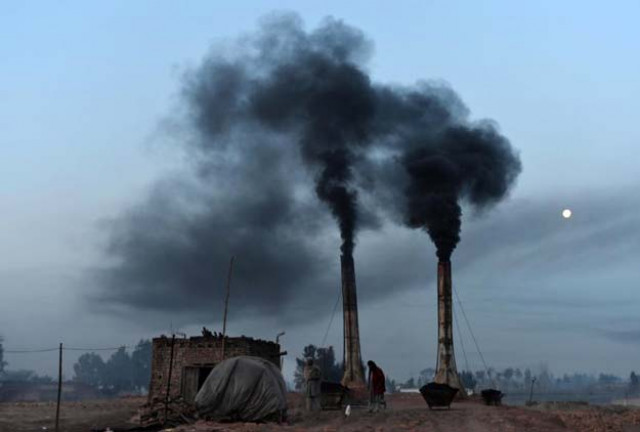Industries violate emissions rules
Put public health at risk; Punjab govt under pressure to address pollution threat

As the threat of smog looms ahead of the arrival of winter, the Punjab government is facing mounting pressure to address air pollution, particularly from the industries flouting emissions standards.
The Punjab State of the Environment Report 2023 highlights severe violations by various sectors, including brick kilns and refineries, which have dangerously exceeded the prescribed limits for smoke emissions.
Despite the public belief that vehicular pollution is the main cause of poor air quality, the report shows industrial emissions, particularly PM2.5 and NOx, as the dominant threat. Experts are calling for the immediate enforcement of regulations to safeguard public health and ease the strain on the already struggling healthcare system.
The Punjab State of the Environment Report 2023 clearly stated that 232 inspections of industrial stack emissions were carried out by the environmental laboratories of the Environmental Protection Agency (EPA) Punjab during 2023. The compliance monitoring showed that brick kilns, oil, fat and vegetable ghee processing units, flour mills, petroleum refineries, pharmaceutical facilities, plastics manufacturing plants, pyrolysis operations, protein factories, and wood product manufacturing units were found to be "very poor".
While paints and dyes factories and thermal power generation plants were rated as "poor" on the basis of monitored parameters, thermal power plants, cement factories and textile mills were the primary NOx emitters.
SO2 surpassed prescribed limits in power plants; multiple industries emitted excessive CO2, whereas all the industries inspected except for sugar mills had smoke emissions exceeding the prescribed Punjab Environmental Quality Standards' (PEQS) limits.
The report stated that from January 1, 2023 to December 18, 2023, a total of 0.2 million tests were conducted on vehicles and the average clearance rate was 67.7%, meaning that roughly two-thirds of the vehicles were roadworthy. This indicates that contrary to the popular opinion, whereby the transport sector is generally held responsible for poor air quality, the empirical analysis suggests otherwise.
According to the Country Climate and Development Report (CCDR) of the World Bank, International Finance Corporation and Multilateral Investment Guarantee Agency, air pollution shortens an average Pakistani's life expectancy by 4.3 years.
The report pointed out that the most harmful emissions were the fine particulate matter, or PM2.5, and NOx. Pakistan's PM2.5 concentration level is, on average, estimated at 49.5 micrograms per cubic meter (?g/m), five times higher than the World Health Organisation's (WHO) recommended limit and poses a serious health hazard.
"The concentration of PM2.5 is in regions with high agricultural and industrial economic activity, mostly in Punjab and Sindh. In highly urbanised cities, especially Lahore, Karachi and Peshawar, more than 1 million citizens are at increased mortality risk from air pollution," said the report.
Environmental and industrial experts suggest that immediate measures should be taken against the industrial units that are not compliant with the standards for smoke emissions to reduce pollution and improve air quality in the best interest of the public which is affected every year.
"The government should not leave the masses to face such toxic and dangerous pollution by tolerating the industrial units violating pollution control/emissions regulations. This, in turn, increases the health bills of people and puts a burden on the already weak healthcare system of the country," they said.
The experts emphasised strict enforcement of the regulations to control emissions because it contradicted the human rights of the citizens of the country in general and of Sindh and Punjab in particular.
"The day-by-day increasing air pollution is one of the main reasons why our healthcare system is heavily burdened. The country has to control this industrial pollution to make more inroads into European and other allied markets for better exports.
"If it is not controlled, the system will collapse soon and will wreak havoc," they cautioned.



















COMMENTS
Comments are moderated and generally will be posted if they are on-topic and not abusive.
For more information, please see our Comments FAQ